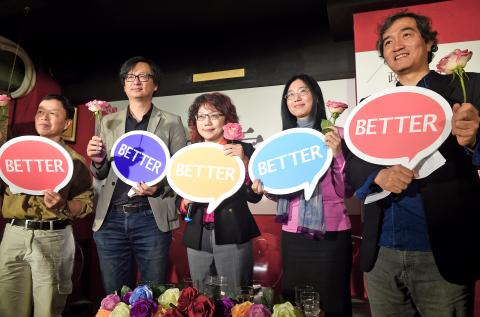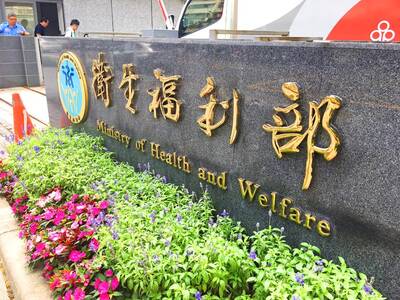Cooperation among candidates from smaller political parties showed a glimmer of hope yesterday, as the New Power Party’s (NPP) Freddy Lim (林昶佐) withdrew from the legislative race in Taipei’s Daan District (大安) to make way for Fan Yun (范雲) of the Social Democratic Party (SDP).
In a dramatic turn of events, Lim, frontman of metal band Chthonic, declared his withdrawal within an hour of Fan officially announcing her bid for legislator yesterday morning.
Lim said he would continue his legislative campaign in another constituency in Taipei, adding that his decision would be finalized by Thursday.

Photo: Chien Jung-fong, Taipei Times
He added that withdrawing from the race could prevent the ruling “party-state interest structure” from reaping the benefits of disunity among minor parties with progressive agendas.
“Our goal has always been to bring together progressive forces and win the election,” Lim said. “In expressing openness and goodwill [toward potential allies], we require more action instead of just talk.”
The move was seen as an attempt at reconciliation, as both parties emerged from a split in the Taiwan Citizen’s Union activist group after its members encountered differences over legislative nomination mechanisms.
Earlier in the morning, Fan made official her bid to enter the legislative race for Daan, confirming months of speculation.
Along with other members of the SDP — which is to be officially launched by the end of this month — Fan vowed to introduce a new political culture centered on the public discussion of policy-oriented goals.
She said that the nation’s politics were blighted by collusion between large corporations and politicians, while the needs of underprivileged groups were constantly ignored.
Fan, a professor of sociology at National Taiwan University, has more than two decades of experience in social activism, including advocacy for women’s rights and supporting pro-democracy student movements.
As both parties were launched by veteran social activists and count prominent supporters of Taiwanese independence among their ranks, the NPP and SDP are more likely to compete for pan-green voters who lean toward the Democratic Progressive Party (DPP).
However, the two nascent parties have adopted markedly different attitudes toward the presidential election, which is to be held concurrently with the legislative elections in January next year.
Fan said yesterday that the SDP would not endorse any presidential candidate, as the SDP was launched precisely to voice dissatisfaction toward both major parties.
In contrast, NPP founder and human rights lawyer Lin Feng-jeng (林?正) said that his party would eventually announce its support for a presidential candidate, as “elections are always a matter of comparison.”
While the NPP has expressed its desire to forge an alliance with the DPP, Fan said that the SDP would limit its options to other minor parties, such as the environmental issue-based Green Party.
“Any kind of cooperation should be built upon common ideals; a short-term alliance based merely on winning votes does not carry much meaning,” Fan said.

POLAM KOPITIAM CASE: Of the two people still in hospital, one has undergone a liver transplant and is improving, while the other is being evaluated for a liver transplant A fourth person has died from bongkrek acid poisoning linked to the Polam Kopitiam (寶林茶室) restaurant in Taipei’s Far Eastern Sogo Xinyi A13 Department Store, the Ministry of Health and Welfare said yesterday, as two other people remain seriously ill in hospital. The first death was reported on March 24. The man had been 39 years old and had eaten at the restaurant on March 22. As more cases of suspected food poisoning involving people who had eaten at the restaurant were reported by hospitals on March 26, the ministry and the Taipei Department of Health launched an investigation. The Food and

A fourth person has died in a food poisoning outbreak linked to the Xinyi (信義) branch of Malaysian restaurant chain Polam Kopitiam (寶林茶室) in Taipei, Deputy Minister of Health and Welfare Victor Wang (王必勝) said on Monday. It was the second fatality in three days, after another was announced on Saturday. The 40-year-old woman experienced multiple organ failure in the early hours on Monday, and the family decided not to undergo emergency resuscitation, Wang said. She initially showed signs of improvement after seeking medical treatment for nausea, vomiting and diarrhea, but her condition worsened due to an infection, he said. Two others who

MEDICAL: The bills would also upgrade the status of the Ethical Guidelines Governing the Research of Human Embryos and Embryonic Stem Cell Research to law The Executive Yuan yesterday approved two bills to govern regenerative medicine that aim to boost development of the field. Taiwan would reach an important milestone in regenerative medicine development with passage of the regenerative medicine act and the regenerative medicine preparations ordinance, which would allow studies to proceed and treatments to be developed, Deputy Minister of Health and Welfare Victor Wang (王必勝) told reporters at a news conference after a Cabinet meeting. Regenerative treatments have been used for several conditions, including cancer — by regenerating blood cells — and restoring joint function in soft tissue, Wang said. The draft legislation requires regenerative treatments

Taiwanese should be mindful when visiting China, as Beijing in July is likely to tighten the implementation of policies on national security following the introduction of two regulations, a researcher said on Saturday. China on Friday unveiled the regulations governing the law enforcement and judicial activities of national security agencies. They would help crack down on “illegal” and “criminal” activities that Beijing considers to be endangering national security, according to reports by China’s state media. The definition of what constitutes a national security threat in China is vague, Taiwan Thinktank researcher Wu Se-chih (吳瑟致) said. The two procedural regulations are to provide Chinese